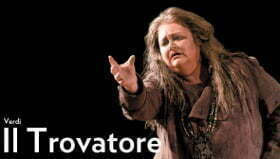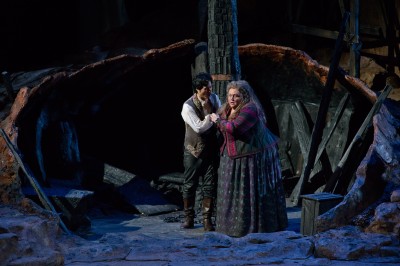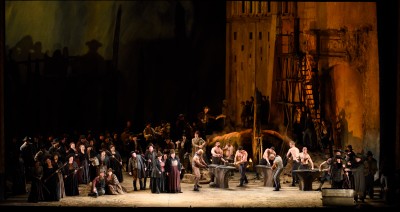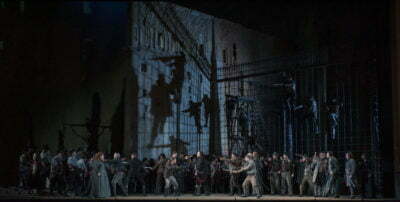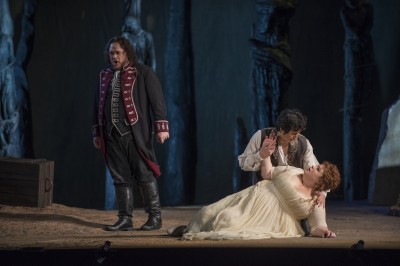Il Trovatore
Libretto by Salvatore Cammarano
Conducted by Asher Fisch
Originally Directed by Sir David McVicar
Revival Direction by Leah Hausman
Produced by Lyric Opera of Chicago
Grandest of Grand Operas Now at Lyric Opera of Chicago
Sir David McVicar’s production of Il Trovatore, which was presented at the Met in 2009, now returns to Chicago. It’s an excellent example of how to stage classical opera in a way that balances music, spectacle, and story-telling to maximize the genre’s potential effect on the audience.
Verdi’s 1853 opera is here interpreted during a civil war in early nineteenth-century Spain. Loyalist commander Ferrando (bass Andrea Silvestrelli) keeps his soldiers awake one night by telling them a spooky story. Years ago, the old count had a “gypsy” burnt at the stake because he blamed her sorcery for his younger son’s illness. The gypsy’s daughter then abducted the little boy, and burnt him on the same pyre as her mother. It just so happens that this is the backstory to the plot, and the present Count di Luna (baritone Quinn Kelsey) is the surviving brother. Currently, he is at the castle to woo the noblewoman Leonora (soprano Amber Wagner).
But di Luna has a rival: the troubadour Manrico (tenor Yonghoon Lee), who is also a commander of the rebels. Leonora prefers Manrico, but he gets driven away by di Luna. At his camp, Manrico’s mother Azucena (mezzo-soprano Stephanie Blythe) reveals that she is the gypsy’s daughter, but her attempt at revenge didn’t actually go that well. She was carrying her own son when she kidnapped the youngest di Luna, and accidentally threw the wrong baby in the fire. It was an honest mistake that could happen to anyone. But she raised Manrico like her own and rescued him from the battlefield, so he should still avenge grandma.
It wouldn’t be a melodrama if it didn’t require strong music to carry it, but of course, that’s why it’s famous. The principals all inhabit their characters and make them work within the context of this world. In her song “Stride la vampa,” Blythe establishes her character’s self-loathing and anger against the world. But there’s also a grim pleasure in being a revenger; she smiles as she gives a little boy a knife to make mischief of his own. Kelsey’s di Luna is a stooped, scruffy man who has the misfortune of appearing messy when he really isn’t. His aria “Il balen del suo sorriso” is a heartfelt ode to Leonora, but crosses into unhealthy obsession.
I thought it a bold choice to play di Luna’s rivalry with Manrico like adolescent posturing. Nick Sandys choreographed thrilling acrobatic sword-fighting, but di Luna’s and Manrico’s scuffles involved just as much shoving and snorting, much to the audience’s amusement. Lee’s Manrico is a haughty romantic who poses like he knows he’s in an opera. But his “Ah sì, ben mio, coll’essere,” sung to Leonora late in the story, is charming. Leonora emerges late in the story as the main hero. Her tragedy is thinking the conflict is still about her even though it had become more about the murders a long time ago, but she’s still willing to sacrifice herself. Wagner’s singing is what kept me alert and engaged after one hundred and fifty minutes in the theatre. Her excellence is what makes the fourth act and winds up stealing the show.
Between acts, a detail from Goya’s A Pilgrimage to San Isidro covers the stage, and the designers (Charles Edward, set; Brigette Reiffenstuel, costumes; Jenifer Tipton, lighting; Sarah Hatten, makeup) created the show around Goya’s style. The dark color scheme and larger than life figure of Azucena’s burnt mother, still suspended from the stake, create the slightly otherworldly atmosphere in which an operatic story can take place. Conductor Asher Fisch keeps the music passionate throughout the show. This production is a must-see for opera fans, and provides a strong starting point for somebody new to opera. (Many theater goers will have gotten their first look at Il Trovatore in the Marx Brothers’ A Night at the Opera). The directors express some concern in their bios about making Il Trovatore’s story work, but their careful handling of every aspect of the production succeeds, especially for the many who love Verdi’s music.
Highly Recommended
Jacob Davis
3jacob.davis@gmail.com
Reviewed November 5, 2014
For more information, visit Il Trovatore’s page at Theatre in Chicago.
At the Lyric Opera of Chicago in the Civic Opera House, 20 North Wacker Drive. Call 312-827-5600 or visit www.lyricopera.org. Tickets $20-$249. Runs Through November 29. Running time is 3 hours with one intermission.

